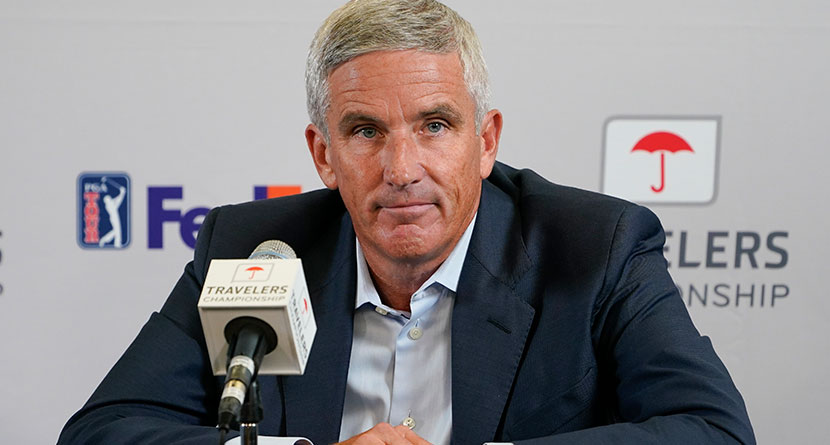The PGA Tour does not think the plan to roll back the golf ball is good for the game and has notified the USGA and R&A that it will not support the proposal they have in mind.
The opposition to the “Modified Local Rule” came from PGA Tour Commissioner Jay Monahan in a Wednesday evening memo to the players. The Associated Press obtained a copy of the memo, which also outlines progress on the deal with the Saudi-backers of LIV Golf.
The governing bodies had set a deadline of Aug. 15 to receive feedback on the proposal, which would give tours the option to require a golf ball that goes about 15 yards shorter for the biggest hitters. If adopted, it would not take effect until 2026.
“As you know, we have spent the last two years undertaking a comprehensive analysis of distance on the PGA Tour and its impact,” Monahan wrote. “Although there has been some level of support for limiting future increases, there is widespread and significant belief the proposed Modified Local rule is not warranted and is not in the best interest of the game.”
Monahan said the PGA Tour notified the USGA and R&A after a recent Player Advisory Council meeting.
“While the PGA Tour is committed to collaborating with them — and all industry partners — to arrive at a solution that will best serve our players, our fans and the game at all levels, we are not able to support the MLR as proposed,” he wrote.
Such a rule would have brought two sets of rules to golf for the first time.
It also had the potential of costing elite players millions in endorsement money. Some manufacturers had pushed back at the notion of investing in a new golf ball they would be unlikely to sell to the general public, which would not be required to use a shorter ball.
The USGA refrained from a specific reaction to the PGA Tour decision because it remains in the “Notice & Comment” period through Aug. 15 in which feedback comes from all sectors of golf.
“The PGA Tour is an important stakeholder and we appreciate the feedback they have contributed to this conversation,” the USGA said in a statement Wednesday night.
The tour decision was not a big surprise. The USGA met with players at the Memorial two months ago and officials in the meeting said a proposed rollback did not go over well. Patrick Cantlay had said “tensions were high” in the Memorial meeting.
The decision to propose a rollback stemmed from the “Distance Insights Project” released in 2020 that suggest average gains of about 30 yards by PGA Tour players over the last 25 years was not good for the game. USGA CEO Mike Whan had said to do nothing would be “borderline irresponsible.”
Martin Slumbers, the CEO of the R&A, echoed those comments last week at the British Open.
“We’ve put forward a targeted and proportionate measure to address a complex issue which we believe is key to preserving the inherent challenge of golf and to ensuring that it has a sustainable future,” Slumbers said.
Monahan, who took a five-week leave from the PGA Tour right after announcing a framework agreement with Saudi Arabia’s national wealth fund because of a “medical situation,” returned last week and said he was feeling “stronger than ever.”
While offering no details on reaching a definitive agreement, Monahan said a virtual policy board meeting and a call with the 16-member PAC yielded appointments for a few areas.
Randall Stephenson, the retired AT&T chairman and CEO, announced he was resigning from the board because he could not support a deal with the Saudis, particularly in light of the killing of Washington Post columnist Jamal Khashoggi.
Monahan said Cantlay and Webb Simpson, along with independent directors Mark Flaherty and Mary Meeker, would comprise the search committee for Stephenson’s replacement. He said any candidate must have unanimous board support.
Stephenson, Meeker and Flaherty were left out of negotiations that led to the Saudi agreement.
Monahan also said in his memo Colin Neville of The Raine Group has been retained to advise the player directors on the PGA Tour board as it works toward details in the business partnership among the Public Investment Fund and the European tour.
Neville was involved in the team concept of the Premier Golf League, which never got off the ground and preceded LIV Golf. Neville also was part of the Delaware player meeting last year that led to a restructuring of the PGA Tour schedule aimed at getting the best players together more often.
The PGA Tour is set to release its 2024 schedule in two weeks at the start of the postseason.
Monahan said two key components of the deal was how players would benefit financially and what kind of discipline LIV players would face should they want to return to the tour.
He said the Player Benefit Program, if a definitive agreement is reached “will be financially significant in total and incremental to our planned compensation package” and would benefit players “from across the membership.”
As for player discipline, he said a task force is evaluating potential paths back and that all aspects of PGA Tour regulations are being considered.
Meanwhile, Jason Gore has been elevated to executive vice president and chief player officer to better listen and serve players. The job description means for the first time, the Players Relations department reports directly to the commissioner.




